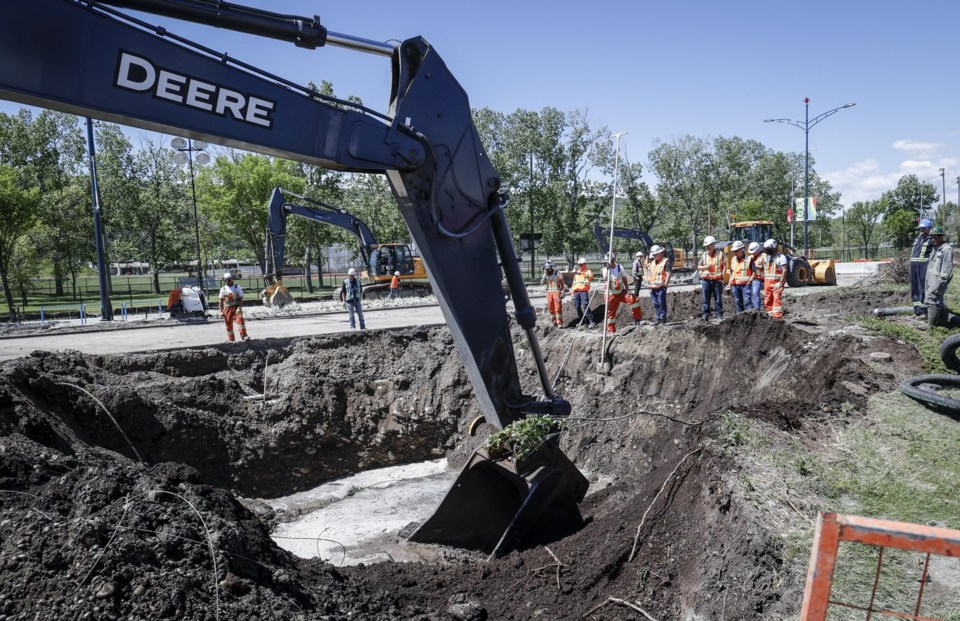CALGARY — Repairs to a fractured Calgary water pipe were to resume Thursday after two workers were injured at the site, while the city's mayor pleaded with residents to step up their conservation efforts.
Chris Collier, the city's director of occupational safety, said welding the replacement pipe into place would continue after provincial officials gave the all-clear Thursday morning.
"This morning, (Occupational Health and Safety) Alberta determined welding work could continue," he said.
The workers were taken to hospital Wednesday night and one remained there with serious but non-life-threatening injuries.
Infrastructure director Francois Bouchard said the injuries are likely to delay the repairs by a day or two. Previous estimates suggested repairs would be complete by the middle of next week.
Meanwhile, Mayor Jyoti Gondek continued to plead with Calgarians to conserve water after recent days saw consistent increases in consumption.
"That is taking us far above the safety threshold," she said. "This morning, we were at a place where we really didn't have enough of a cushion for lifesaving efforts like those in hospitals and firefighting."
Gondek said daily water use increased by another eight million litres on Wednesday. That would bring the city's consumption up to 490 million litres -- well above Saturday's 440-million-litre mark.
"We have to be doing this together," she said. "This is not a joke and it is certainly not a conspiracy. It is serious."
That warning became reality Wednesday night when firefighters responded to a call. Emergency management chief Sue Henry said early response allowed crews to extinguish the blaze with 100,000 litres of water instead of the average requirement of up to 1.5 million litres.
"This is a great reminder to ensure that our first responders have the water that they need," she said.
Bouchard said the seven-metre replacement length of pipe was in place and that a robot inspection device had checked out about four kilometres of line -- about 80 per cent of that section of pipe, which carries 60 per cent of the city's water.
"This experience has led us to do further tests to look at the condition of the pipe now that it has been drained for the repair," he said.
All residents have been asked to cut their water usage at home with measures like shorter showers and fewer toilet flushes. A mandatory ban was ordered on outdoor watering, window washing and fires.
Bouchard said the city does have the power to restrict indoor water use.
"We don't want to unnecessarily impact people's livelihoods," he said. "However, we are prepared to take more firm measures if consumption levels require it."
The break occurred June 5, making Thursday Calgary's eighth day of restrictions.
A seven-metre section of replacement pipe, big enough in diameter for a car to drive through, arrived on the site Tuesday.
Installing and welding the new pipe into place was expected to take about two days. Flushing and filling the pipe will take another three. Finally, readying the new section of pipe for water flow into the city's underground reservoirs will take two days.
City officials have said the pipe was 49 years into its expected 100-year life and there was no indication from any of the city's monitoring that the pipe was about to fail. Modelling of pipe stresses, including factors like age, pipe materials and operating pressures, didn't suggest an inspection was needed, Bouchard said.
The pipe was running within its pressure limits. Acoustic monitors, designed to detect early signs of failure, revealed none.
Bouchard said physically inspecting the pipe would have required shutting it down and digging it up, putting stress on both it and other pipes in the system.
Henry said bylaw officers were taking an "education approach" to calls about improper water use.
She said the city had received 1,250 such calls. Officers had issued 376 written warnings, two tickets concerning water and one for fire.
-- By Bob Weber in Edmonton
This report by The Canadian Press was first published June 13, 2024.
The Canadian Press



